Tackling Global-Local Challenges in Ethics, Responsibility and Sustainability
VerifiedAdded on 2023/04/24
|7
|1458
|70
AI Summary
The article discusses the ethical dilemmas faced in daily life and business scenarios. It explores the different approaches to ethics and their application in business environment. The article concludes that ethical responses are subjective and there are no single correct ways of doing a thing but many ways to arrive at a consensual solution.
Contribute Materials
Your contribution can guide someone’s learning journey. Share your
documents today.
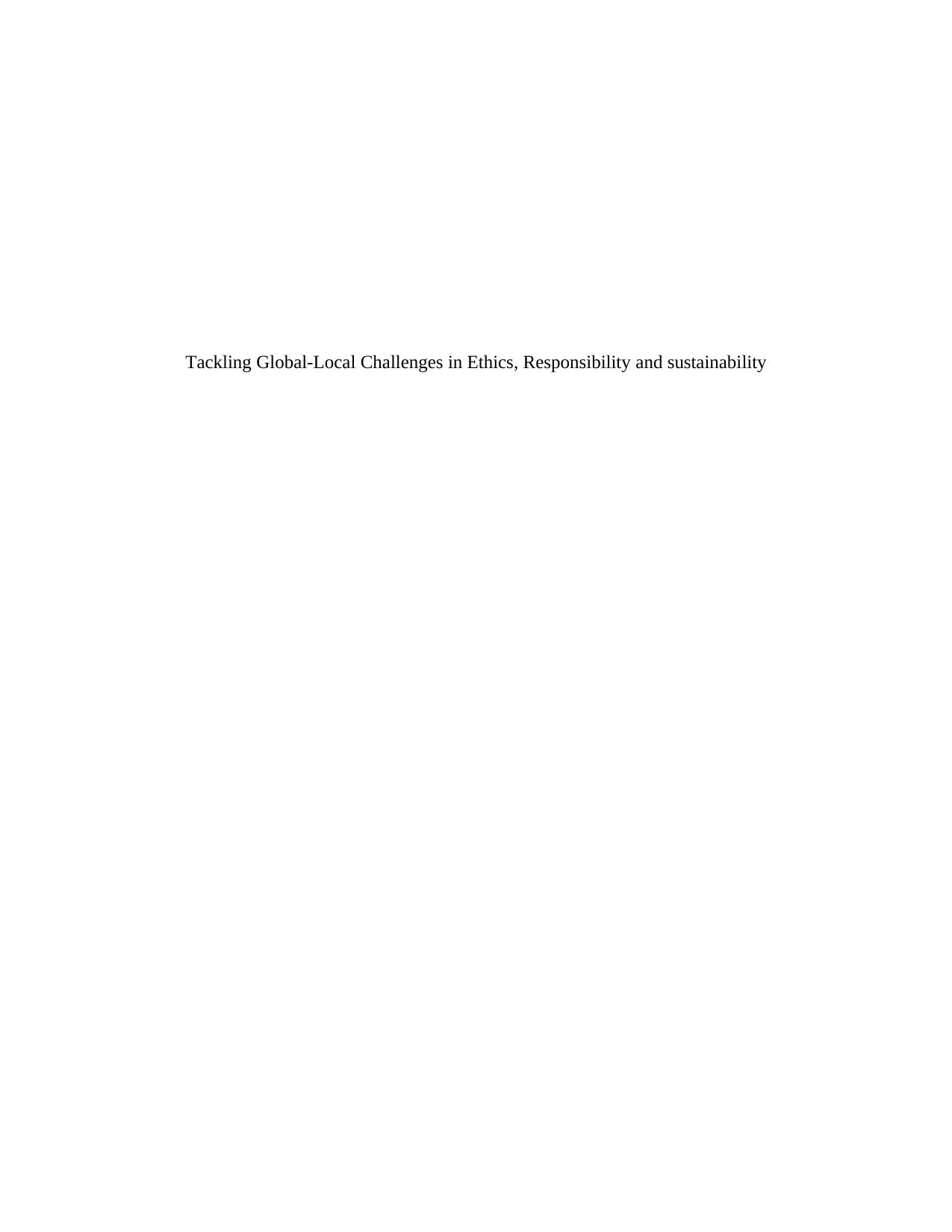
Tackling Global-Local Challenges in Ethics, Responsibility and sustainability
Secure Best Marks with AI Grader
Need help grading? Try our AI Grader for instant feedback on your assignments.
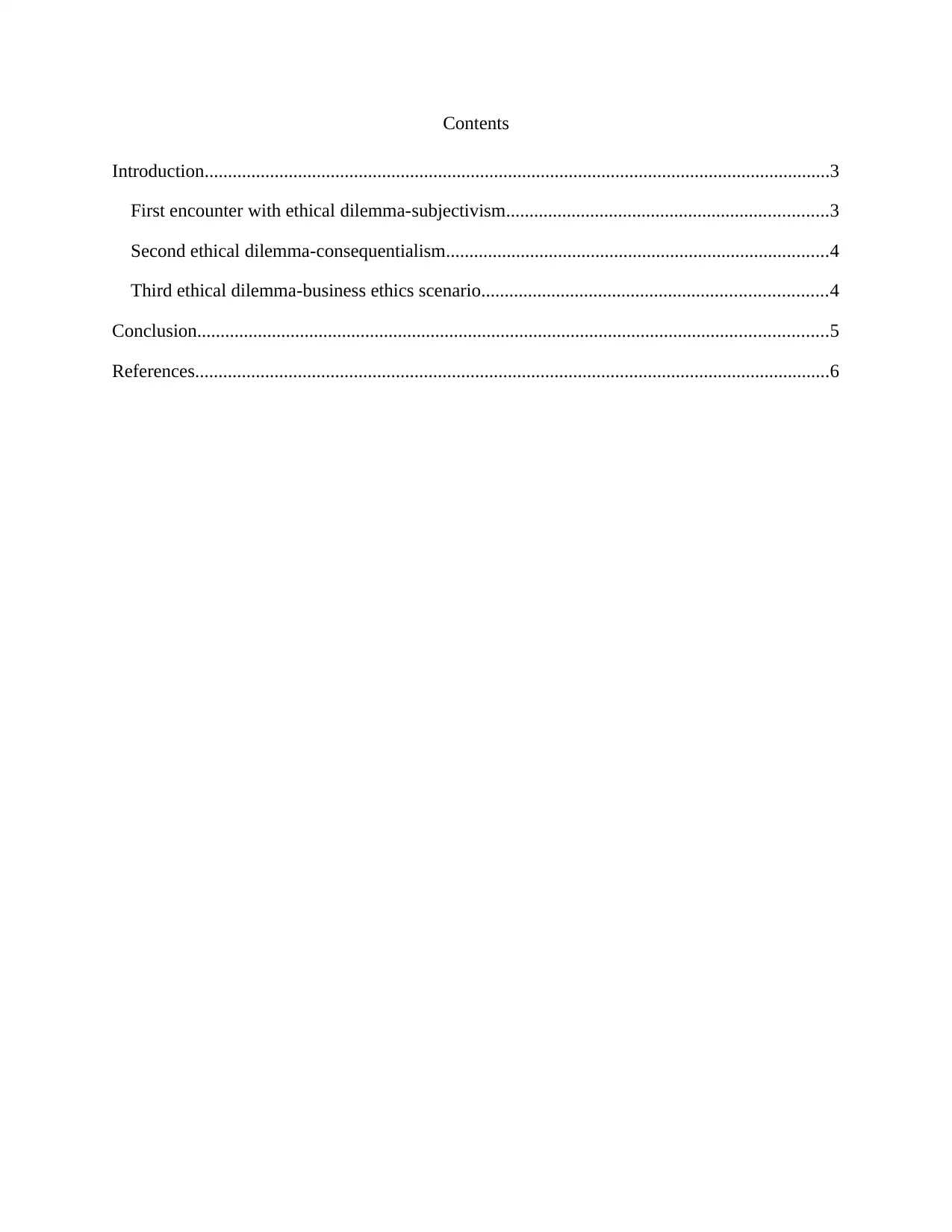
Contents
Introduction......................................................................................................................................3
First encounter with ethical dilemma-subjectivism.....................................................................3
Second ethical dilemma-consequentialism..................................................................................4
Third ethical dilemma-business ethics scenario..........................................................................4
Conclusion.......................................................................................................................................5
References........................................................................................................................................6
Introduction......................................................................................................................................3
First encounter with ethical dilemma-subjectivism.....................................................................3
Second ethical dilemma-consequentialism..................................................................................4
Third ethical dilemma-business ethics scenario..........................................................................4
Conclusion.......................................................................................................................................5
References........................................................................................................................................6
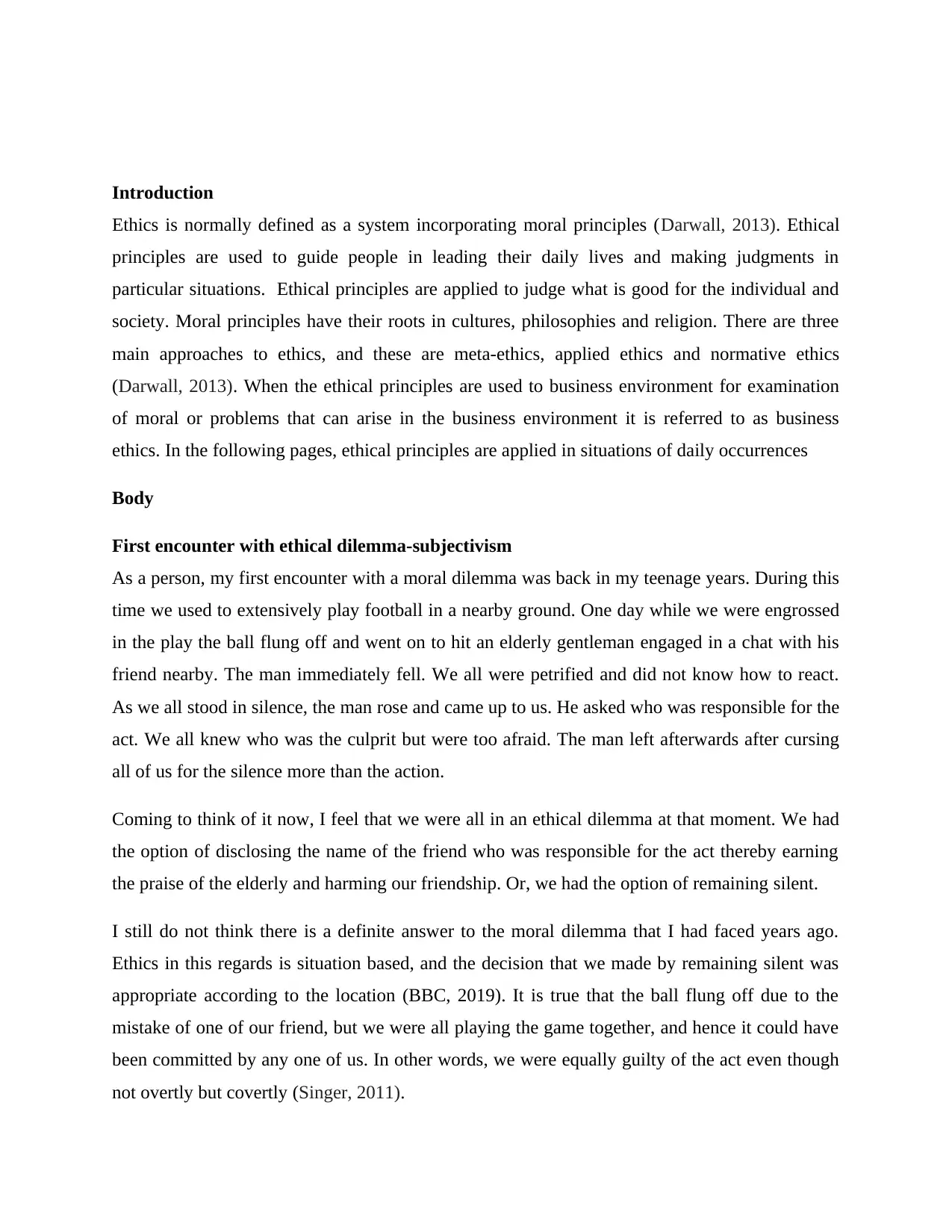
Introduction
Ethics is normally defined as a system incorporating moral principles (Darwall, 2013). Ethical
principles are used to guide people in leading their daily lives and making judgments in
particular situations. Ethical principles are applied to judge what is good for the individual and
society. Moral principles have their roots in cultures, philosophies and religion. There are three
main approaches to ethics, and these are meta-ethics, applied ethics and normative ethics
(Darwall, 2013). When the ethical principles are used to business environment for examination
of moral or problems that can arise in the business environment it is referred to as business
ethics. In the following pages, ethical principles are applied in situations of daily occurrences
Body
First encounter with ethical dilemma-subjectivism
As a person, my first encounter with a moral dilemma was back in my teenage years. During this
time we used to extensively play football in a nearby ground. One day while we were engrossed
in the play the ball flung off and went on to hit an elderly gentleman engaged in a chat with his
friend nearby. The man immediately fell. We all were petrified and did not know how to react.
As we all stood in silence, the man rose and came up to us. He asked who was responsible for the
act. We all knew who was the culprit but were too afraid. The man left afterwards after cursing
all of us for the silence more than the action.
Coming to think of it now, I feel that we were all in an ethical dilemma at that moment. We had
the option of disclosing the name of the friend who was responsible for the act thereby earning
the praise of the elderly and harming our friendship. Or, we had the option of remaining silent.
I still do not think there is a definite answer to the moral dilemma that I had faced years ago.
Ethics in this regards is situation based, and the decision that we made by remaining silent was
appropriate according to the location (BBC, 2019). It is true that the ball flung off due to the
mistake of one of our friend, but we were all playing the game together, and hence it could have
been committed by any one of us. In other words, we were equally guilty of the act even though
not overtly but covertly (Singer, 2011).
Ethics is normally defined as a system incorporating moral principles (Darwall, 2013). Ethical
principles are used to guide people in leading their daily lives and making judgments in
particular situations. Ethical principles are applied to judge what is good for the individual and
society. Moral principles have their roots in cultures, philosophies and religion. There are three
main approaches to ethics, and these are meta-ethics, applied ethics and normative ethics
(Darwall, 2013). When the ethical principles are used to business environment for examination
of moral or problems that can arise in the business environment it is referred to as business
ethics. In the following pages, ethical principles are applied in situations of daily occurrences
Body
First encounter with ethical dilemma-subjectivism
As a person, my first encounter with a moral dilemma was back in my teenage years. During this
time we used to extensively play football in a nearby ground. One day while we were engrossed
in the play the ball flung off and went on to hit an elderly gentleman engaged in a chat with his
friend nearby. The man immediately fell. We all were petrified and did not know how to react.
As we all stood in silence, the man rose and came up to us. He asked who was responsible for the
act. We all knew who was the culprit but were too afraid. The man left afterwards after cursing
all of us for the silence more than the action.
Coming to think of it now, I feel that we were all in an ethical dilemma at that moment. We had
the option of disclosing the name of the friend who was responsible for the act thereby earning
the praise of the elderly and harming our friendship. Or, we had the option of remaining silent.
I still do not think there is a definite answer to the moral dilemma that I had faced years ago.
Ethics in this regards is situation based, and the decision that we made by remaining silent was
appropriate according to the location (BBC, 2019). It is true that the ball flung off due to the
mistake of one of our friend, but we were all playing the game together, and hence it could have
been committed by any one of us. In other words, we were equally guilty of the act even though
not overtly but covertly (Singer, 2011).
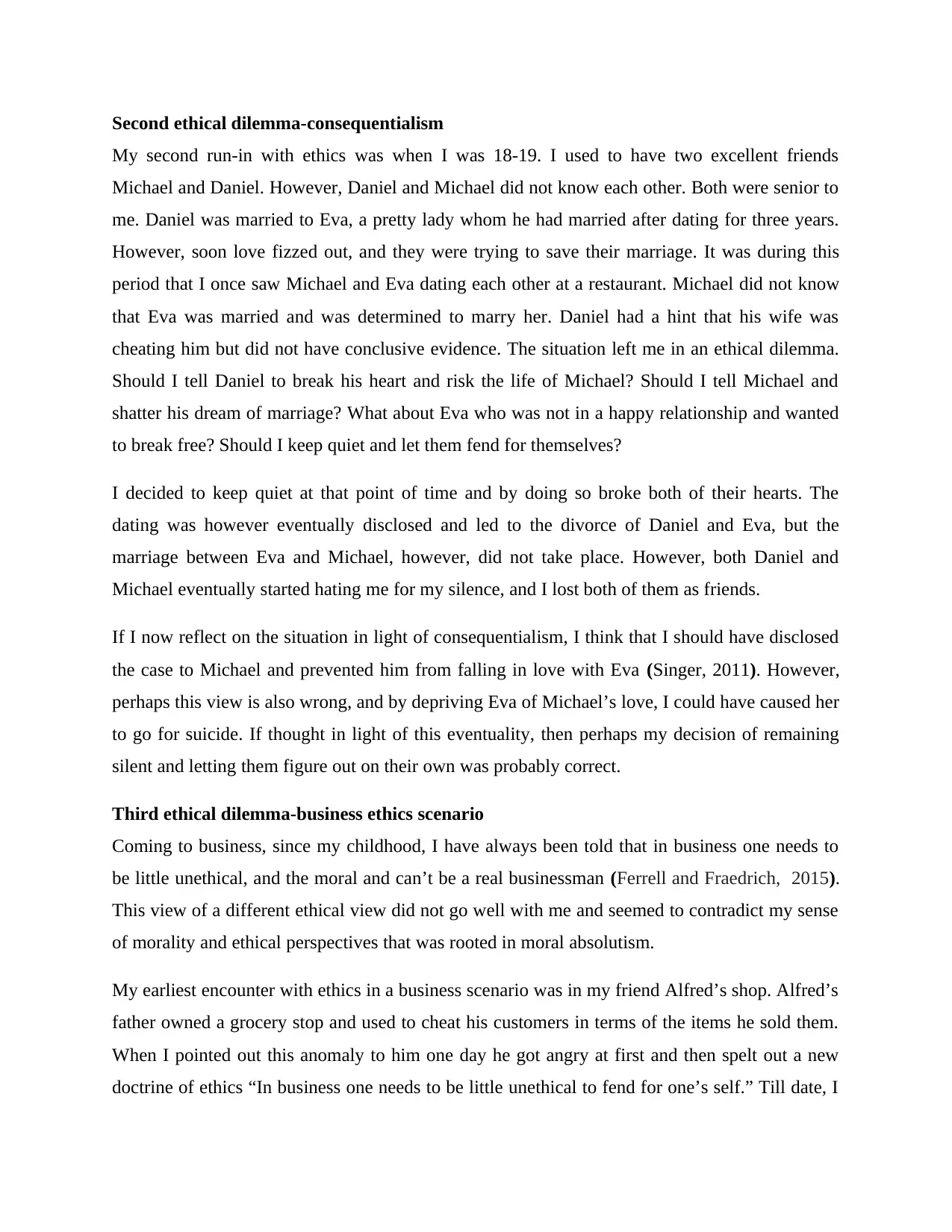
Second ethical dilemma-consequentialism
My second run-in with ethics was when I was 18-19. I used to have two excellent friends
Michael and Daniel. However, Daniel and Michael did not know each other. Both were senior to
me. Daniel was married to Eva, a pretty lady whom he had married after dating for three years.
However, soon love fizzed out, and they were trying to save their marriage. It was during this
period that I once saw Michael and Eva dating each other at a restaurant. Michael did not know
that Eva was married and was determined to marry her. Daniel had a hint that his wife was
cheating him but did not have conclusive evidence. The situation left me in an ethical dilemma.
Should I tell Daniel to break his heart and risk the life of Michael? Should I tell Michael and
shatter his dream of marriage? What about Eva who was not in a happy relationship and wanted
to break free? Should I keep quiet and let them fend for themselves?
I decided to keep quiet at that point of time and by doing so broke both of their hearts. The
dating was however eventually disclosed and led to the divorce of Daniel and Eva, but the
marriage between Eva and Michael, however, did not take place. However, both Daniel and
Michael eventually started hating me for my silence, and I lost both of them as friends.
If I now reflect on the situation in light of consequentialism, I think that I should have disclosed
the case to Michael and prevented him from falling in love with Eva (Singer, 2011). However,
perhaps this view is also wrong, and by depriving Eva of Michael’s love, I could have caused her
to go for suicide. If thought in light of this eventuality, then perhaps my decision of remaining
silent and letting them figure out on their own was probably correct.
Third ethical dilemma-business ethics scenario
Coming to business, since my childhood, I have always been told that in business one needs to
be little unethical, and the moral and can’t be a real businessman (Ferrell and Fraedrich, 2015).
This view of a different ethical view did not go well with me and seemed to contradict my sense
of morality and ethical perspectives that was rooted in moral absolutism.
My earliest encounter with ethics in a business scenario was in my friend Alfred’s shop. Alfred’s
father owned a grocery stop and used to cheat his customers in terms of the items he sold them.
When I pointed out this anomaly to him one day he got angry at first and then spelt out a new
doctrine of ethics “In business one needs to be little unethical to fend for one’s self.” Till date, I
My second run-in with ethics was when I was 18-19. I used to have two excellent friends
Michael and Daniel. However, Daniel and Michael did not know each other. Both were senior to
me. Daniel was married to Eva, a pretty lady whom he had married after dating for three years.
However, soon love fizzed out, and they were trying to save their marriage. It was during this
period that I once saw Michael and Eva dating each other at a restaurant. Michael did not know
that Eva was married and was determined to marry her. Daniel had a hint that his wife was
cheating him but did not have conclusive evidence. The situation left me in an ethical dilemma.
Should I tell Daniel to break his heart and risk the life of Michael? Should I tell Michael and
shatter his dream of marriage? What about Eva who was not in a happy relationship and wanted
to break free? Should I keep quiet and let them fend for themselves?
I decided to keep quiet at that point of time and by doing so broke both of their hearts. The
dating was however eventually disclosed and led to the divorce of Daniel and Eva, but the
marriage between Eva and Michael, however, did not take place. However, both Daniel and
Michael eventually started hating me for my silence, and I lost both of them as friends.
If I now reflect on the situation in light of consequentialism, I think that I should have disclosed
the case to Michael and prevented him from falling in love with Eva (Singer, 2011). However,
perhaps this view is also wrong, and by depriving Eva of Michael’s love, I could have caused her
to go for suicide. If thought in light of this eventuality, then perhaps my decision of remaining
silent and letting them figure out on their own was probably correct.
Third ethical dilemma-business ethics scenario
Coming to business, since my childhood, I have always been told that in business one needs to
be little unethical, and the moral and can’t be a real businessman (Ferrell and Fraedrich, 2015).
This view of a different ethical view did not go well with me and seemed to contradict my sense
of morality and ethical perspectives that was rooted in moral absolutism.
My earliest encounter with ethics in a business scenario was in my friend Alfred’s shop. Alfred’s
father owned a grocery stop and used to cheat his customers in terms of the items he sold them.
When I pointed out this anomaly to him one day he got angry at first and then spelt out a new
doctrine of ethics “In business one needs to be little unethical to fend for one’s self.” Till date, I
Secure Best Marks with AI Grader
Need help grading? Try our AI Grader for instant feedback on your assignments.
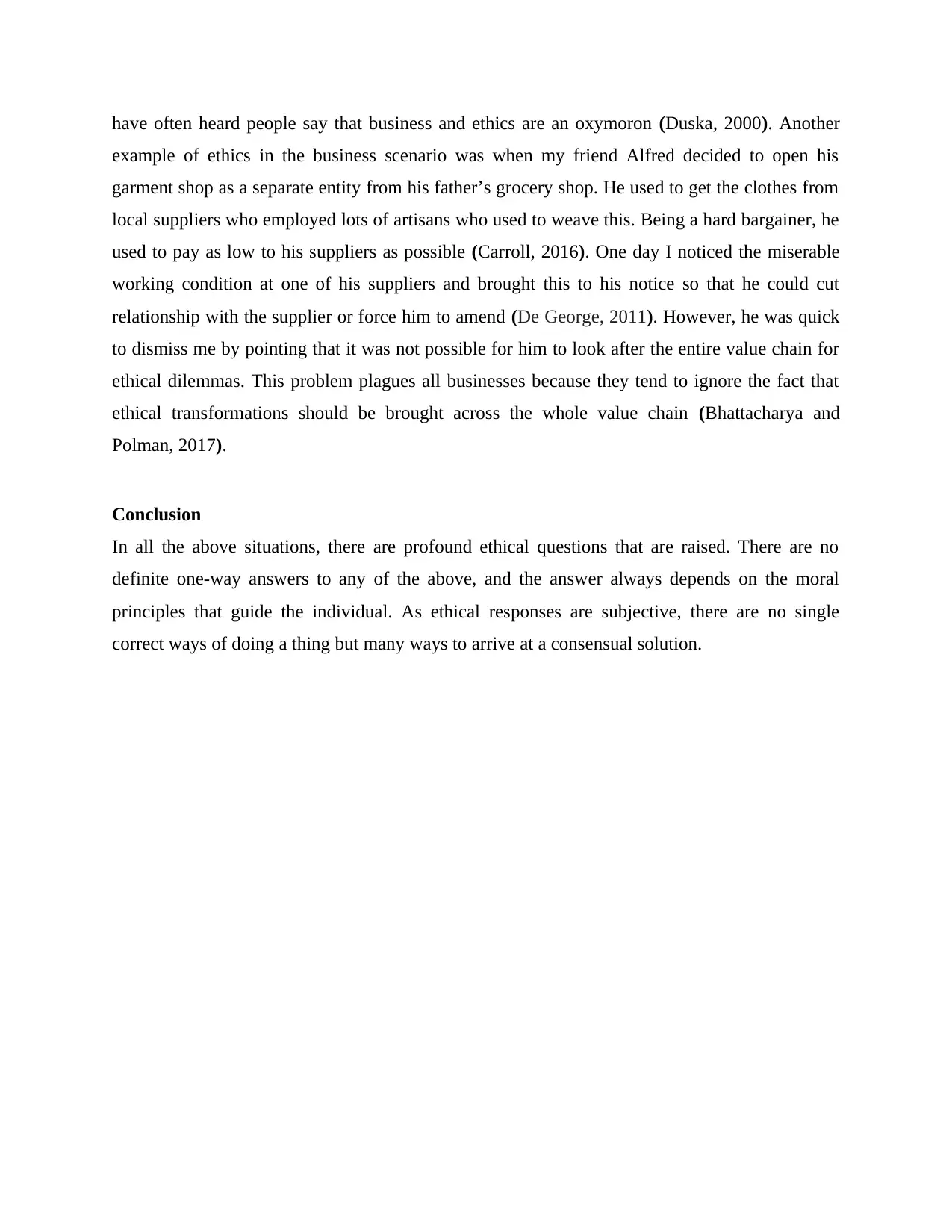
have often heard people say that business and ethics are an oxymoron (Duska, 2000). Another
example of ethics in the business scenario was when my friend Alfred decided to open his
garment shop as a separate entity from his father’s grocery shop. He used to get the clothes from
local suppliers who employed lots of artisans who used to weave this. Being a hard bargainer, he
used to pay as low to his suppliers as possible (Carroll, 2016). One day I noticed the miserable
working condition at one of his suppliers and brought this to his notice so that he could cut
relationship with the supplier or force him to amend (De George, 2011). However, he was quick
to dismiss me by pointing that it was not possible for him to look after the entire value chain for
ethical dilemmas. This problem plagues all businesses because they tend to ignore the fact that
ethical transformations should be brought across the whole value chain (Bhattacharya and
Polman, 2017).
Conclusion
In all the above situations, there are profound ethical questions that are raised. There are no
definite one-way answers to any of the above, and the answer always depends on the moral
principles that guide the individual. As ethical responses are subjective, there are no single
correct ways of doing a thing but many ways to arrive at a consensual solution.
example of ethics in the business scenario was when my friend Alfred decided to open his
garment shop as a separate entity from his father’s grocery shop. He used to get the clothes from
local suppliers who employed lots of artisans who used to weave this. Being a hard bargainer, he
used to pay as low to his suppliers as possible (Carroll, 2016). One day I noticed the miserable
working condition at one of his suppliers and brought this to his notice so that he could cut
relationship with the supplier or force him to amend (De George, 2011). However, he was quick
to dismiss me by pointing that it was not possible for him to look after the entire value chain for
ethical dilemmas. This problem plagues all businesses because they tend to ignore the fact that
ethical transformations should be brought across the whole value chain (Bhattacharya and
Polman, 2017).
Conclusion
In all the above situations, there are profound ethical questions that are raised. There are no
definite one-way answers to any of the above, and the answer always depends on the moral
principles that guide the individual. As ethical responses are subjective, there are no single
correct ways of doing a thing but many ways to arrive at a consensual solution.
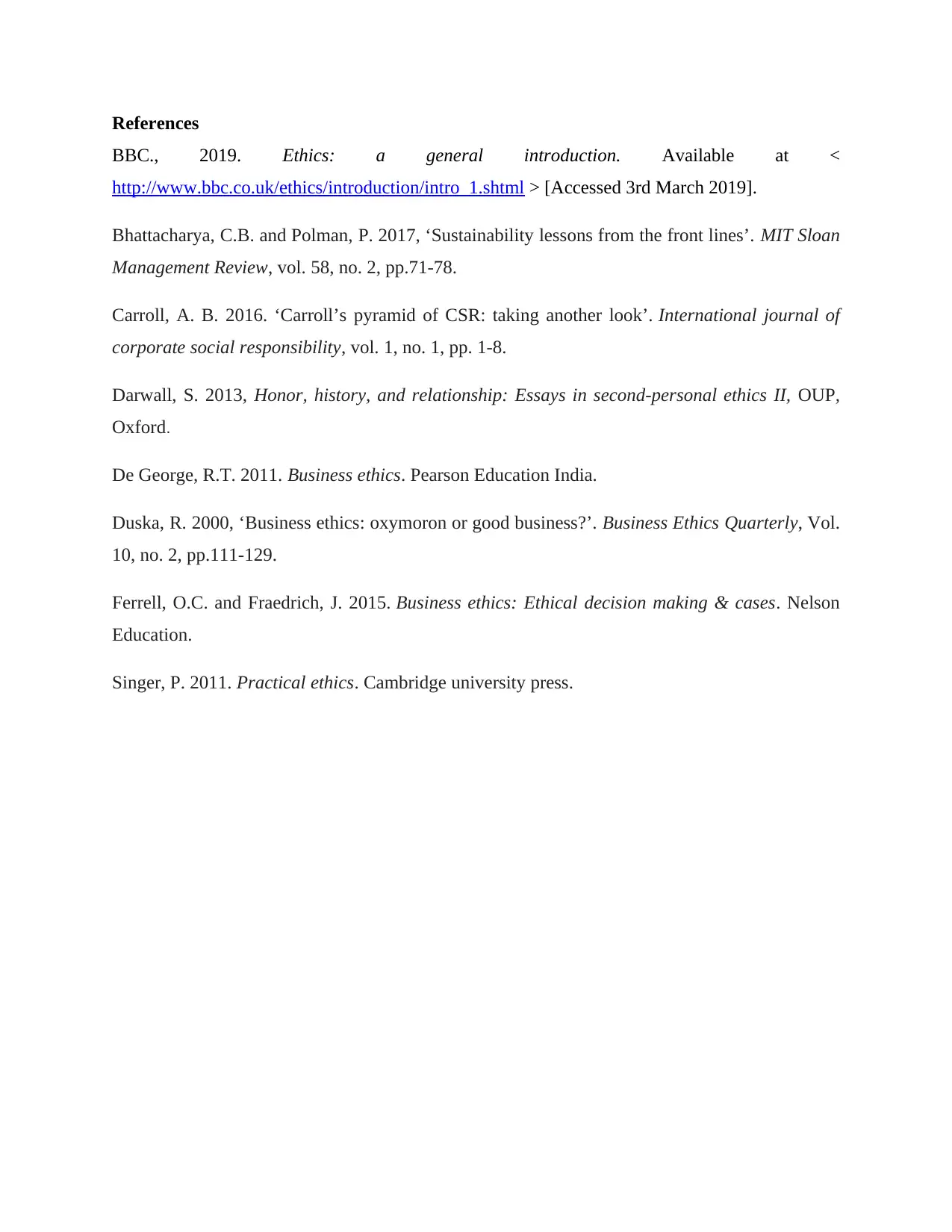
References
BBC., 2019. Ethics: a general introduction. Available at <
http://www.bbc.co.uk/ethics/introduction/intro_1.shtml > [Accessed 3rd March 2019].
Bhattacharya, C.B. and Polman, P. 2017, ‘Sustainability lessons from the front lines’. MIT Sloan
Management Review, vol. 58, no. 2, pp.71-78.
Carroll, A. B. 2016. ‘Carroll’s pyramid of CSR: taking another look’. International journal of
corporate social responsibility, vol. 1, no. 1, pp. 1-8.
Darwall, S. 2013, Honor, history, and relationship: Essays in second-personal ethics II, OUP,
Oxford.
De George, R.T. 2011. Business ethics. Pearson Education India.
Duska, R. 2000, ‘Business ethics: oxymoron or good business?’. Business Ethics Quarterly, Vol.
10, no. 2, pp.111-129.
Ferrell, O.C. and Fraedrich, J. 2015. Business ethics: Ethical decision making & cases. Nelson
Education.
Singer, P. 2011. Practical ethics. Cambridge university press.
BBC., 2019. Ethics: a general introduction. Available at <
http://www.bbc.co.uk/ethics/introduction/intro_1.shtml > [Accessed 3rd March 2019].
Bhattacharya, C.B. and Polman, P. 2017, ‘Sustainability lessons from the front lines’. MIT Sloan
Management Review, vol. 58, no. 2, pp.71-78.
Carroll, A. B. 2016. ‘Carroll’s pyramid of CSR: taking another look’. International journal of
corporate social responsibility, vol. 1, no. 1, pp. 1-8.
Darwall, S. 2013, Honor, history, and relationship: Essays in second-personal ethics II, OUP,
Oxford.
De George, R.T. 2011. Business ethics. Pearson Education India.
Duska, R. 2000, ‘Business ethics: oxymoron or good business?’. Business Ethics Quarterly, Vol.
10, no. 2, pp.111-129.
Ferrell, O.C. and Fraedrich, J. 2015. Business ethics: Ethical decision making & cases. Nelson
Education.
Singer, P. 2011. Practical ethics. Cambridge university press.

1 out of 7
Your All-in-One AI-Powered Toolkit for Academic Success.
+13062052269
info@desklib.com
Available 24*7 on WhatsApp / Email
![[object Object]](/_next/static/media/star-bottom.7253800d.svg)
Unlock your academic potential
© 2024 | Zucol Services PVT LTD | All rights reserved.